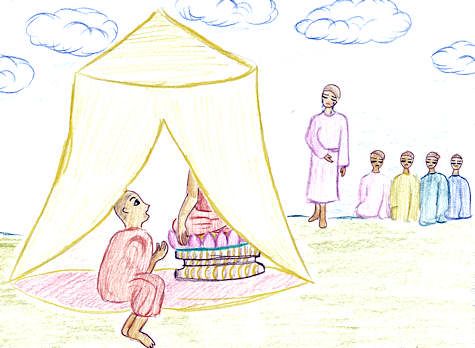
Lady Móhē-bōshé-bōtí and the other women will agree to eight commands.
Drawing by Jinjutha Brahmbhaesajsakul, Sixth College (UCSD), Class of 2011, by permission
Eventually the Buddha and those with him reached the land of Píshèlí 毘舍离 and stayed at the Hermitage of the Great Wood (Dàlín Jīngshè 大林精舍) . There they were astonished to discover Lady Móhē-bōshé-bōtí and the other ladies. They had shaved their heads, donned simple cassocks, and set out for Píshèlí, just as the Buddha had. Indeed, they looked for all the world as though they were already bǐqiū in his movement.
But they were hungry and exhausted, and Lady Móhē-bōshé-bōtí stood outside the entry to the Buddha's encampment and cried piteously. The Buddha's follower Ēnán 阿难 heard her sobs, and he went to see what was the matter.
Ēnán did his best to calm her down, and when she could finally speak, Lady Móhē-bōshé-bōtí explained that she was brokenhearted because the Buddha wouldn't let them join his band.
Ēnán was much moved, and he confessed that he could not think of any objection to her request. He promised to try to persuade the Buddha to let women leave the family and become bǐqiū the same way men could. But again the Buddha refused. Three times Ēnán asked, and three times the Buddha refused.
Then Ēnán asked the Buddha whether women, if they studied the Law and practiced the teachings, could escape from suffering, as men could. The Buddha agreed that they could.
In that case, Ēnán continued, they should be permitted to take that path just like men. And besides, he pointed out, Lady Móhē-bōshé-bōtí was the Buddha's aunt, and his web nurse, who had raised him. Furthermore, she was a person of great sincerity, as the Buddha himself well knew, who would not undertake the ascetic life without being fully aware of what she was doing and committed to it.
"Very well, Ēnán," said the Buddha. If Lady Móhē-bōshé-bōtí and the other women will agree to eight commands (today called the bā jìng fǎ 八敬法), then she may do it and we can have female bǐkqiū."

So Ēnán left the Buddha and relayed the information to Lady Móhē-bōshé-bōtí, who was delighted and agreed to the conditions the Buddha had imposed. And thus she became the first Buddhist nun.
Ēnán went back to see the Buddha and tell him that his aunt had agreed. But the Buddha prophesied that if women participated, then time when the word of the Buddha would prevail on earth would be shortened. And indeed, because Móhē-bōshé-bōtí became a female bǐqiū, the time of the Buddha's law upon the earth was shortened by five hundred years.